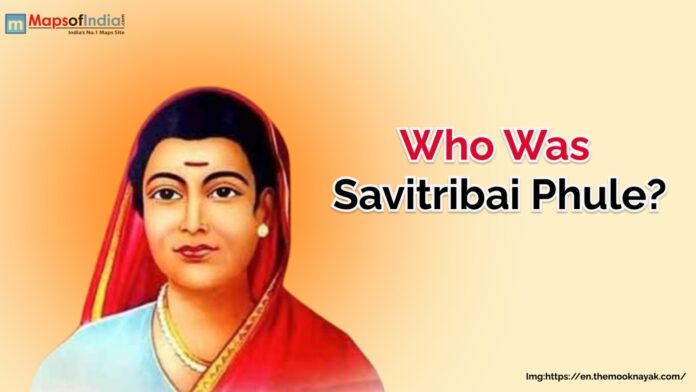Still a towering presence in the annals of Indian social reform and education, Savitribai Phule (1831–1897). Her pioneering efforts with her husband, Jyotirao Phule, in 19th-century Maharashtra set the stage for the feminist movement in India as the first female teacher in that country and a relentless advocate of women’s education and social equality. Her work questioned the firmly ingrained caste and gender inequality of her day, and her legacy inspires social and educational changes now. This page provides a thorough and verified narrative of Savitribai Phule’s life, her contributions to women’s education, her difficulties, and her work’s ongoing influence.
Early Years and Marriage
Born on January 3, 1831, in Naigaon, Maharashtra, Savitribai was a farmer’s daughter and belonged to the Mali caste, regarded as a lower caste in the hierarchical social order of the day. At the age of nine, she married twelve-year-old Jyotirao Phule. Both had a vision of social reform, especially in regard to education, and Jyotirao supported Savitribai’s own education, unusual for women in that age period.
Starting the First School for Girls
In 1848, Tatya Saheb Bhide, Savitribai, and Jyotirao Phule opened the first girls’ school in India at Bhide Wada, Pune, in the house of a local supporter. This was a radical act since traditional society, particularly girls from lower castes, strongly opposed education for women. The curriculum reflected a modern, Western-style mathematics, science, and social studies education. The Phules were a remarkable success by 1851, running three schools with almost 150 students, surpassing the enrolment of government schools girls.
Against the strict caste divisions of the time, their inclusive schools welcomed children from all castes, including Dalits and other underprivileged groups. The Phules founded educational trusts to assist these initiatives, including the Society for Promoting the Education of Mahar, Mangs, etc.
Innovations in Pedagogy and Educational Philosophy
Savitribai Phule’s educational philosophy was forward for her time. She underlined that education, especially for women and underprivileged castes, is a tool for social emancipation and empowerment. Reflecting a culturally sensitive pedagogy meant to make education relevant and accessible to her students’ social settings, her teaching strategies included practical life skills alongside academic subjects. This strategy fits modern educational models prioritising community involvement and contextual learning to overcome obstacles, including early marriage, household duties, and social discrimination.
Difficulties and Social Resistance
Conservative elements in society fiercely objected to the Phules’ work. Savitribai experienced social exclusion, physical violence, and verbal abuse. On her way to school, she was frequently pelted with stones and cow dung; she carried an extra sari to change following such assaults. Their families disapproved; Jyotirao’s father kicked the couple from his 1849 house based on religious texts criticising their work.
Savitribai persisted despite these difficulties. She worked with Fatima Begum Sheikh, the first Muslim woman teacher in India, and together, they opened educational institutions serving underprivileged areas. The bravery of the Phules against persecution came to represent the opposition and motivated others to question accepted social mores.
More General Social Reforms
Savitribai Phule was a passionate social reformer outside of the classroom. She advocated against child marriage, the custom of sati (widow immolation), and the stigmatisation of widows who were sometimes compelled to shave their heads and lead austere lives. Challenging repressive practices, she and Jyotirao planned strikes against barbers shaving widows’ heads.
The Phules founded the Balhatya Pratibandhak Griha in 1863 as a refuge for expectant widows to stop infanticide and offer abandoned children safe delivery and treatment. This innovative project provided women dignity and support while tackling a serious social issue.
In 1873, they also established the Satya Shodhak Samaj, a group committed to eradicating caste discrimination and advancing social equality. This platform allowed them to advocate more broadly for the rights of women and underprivileged castes.
Literary Gifts
Savitribai also wrote and poetically created. Through her works, Kavya Phule (1854) and Bavan Kashi Subodh Ratnakar (1892), she conveyed her feminist principles and social criticisms. Her poem “Go, Get Education” exhorted underprivileged people to free themselves from knowledge. She also founded the Mahila Seva Mandal, a women’s group aiming to increase awareness of social concerns and women’s rights.
Influence and Legacy
The innovative work of Savitribai Phule changed the scene of women’s education in India. She questioned the conventional wisdom that said women and lower castes were unworthy of education by opening schools for girls and underprivileged communities. Her schools taught women confidence, financial independence, social awareness, academic knowledge, and other skills.
At the time, her teaching strategies were regarded as better than those of government schools; moreover, the enrolment of girls in her schools exceeded that of boys in official institutions. Even if many Phule schools closed by 1858 because of political upheavals following the 1857 Rebellion and financial problems, their influence persisted.
Savitribai’s legacy still inspires Indian feminist and social justice movements. Though much has been done, gender—and caste-based discrimination in education still exists. Thus, her vision of universal, inclusive education is as relevant today as it was more than 150 years ago.
Her life is remembered every year, and many establishments, including Savitribai Phule Pune University, have her name in recognition of her contributions. She is especially known as a champion of social reform and a forerunner of India’s feminist movement.
Social ostracism, gender bias, and caste discrimination remain relevant in modern India and are challenges Savitribai Phule faces. Emphasising culturally sensitive teaching, community involvement, and practical education to address ongoing inequality, efforts to improve girls’ education continue to draw on her legacy. Her efforts prepared the way for educational policies aiming at giving every child, regardless of gender or caste, fair access to education.
The path taken by Savitribai Phule from a small child in rural Maharashtra to India’s first female teacher and a fearless social reformer shows the transforming power of education. Her commitment to women’s social equality and education challenged repressive customs and created opportunities for future generations of women and underprivileged groups. Through her schools, publications, and activism, she created a road towards a more fair and inclusive society.
Her narrative is evidence of the power-driven people have in tearing down institutionalised inequality. Savitribai Phule’s life is still a lighthouse of hope and a call to action for teachers, legislators, and activists as India keeps working towards gender and caste fairness in education.




